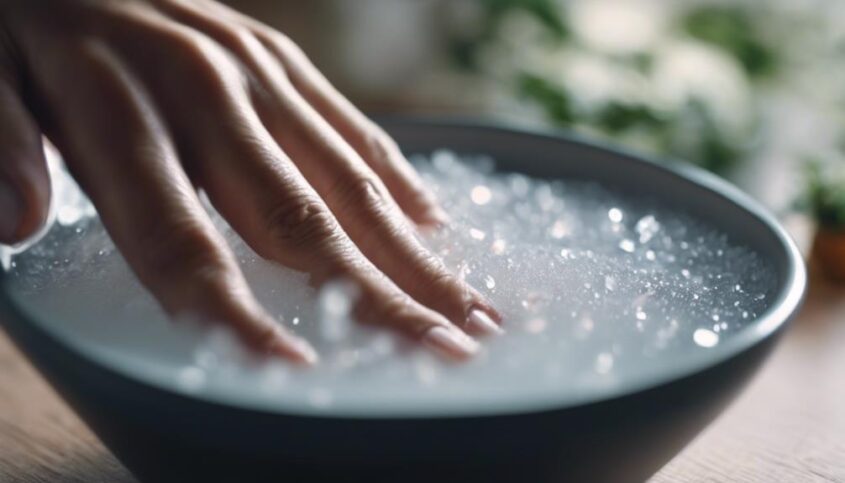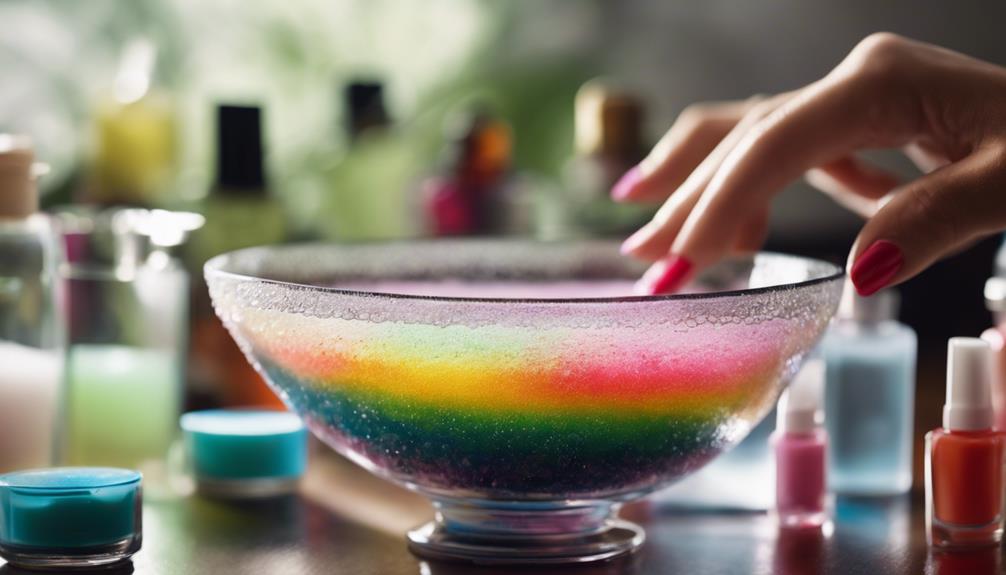What Does Epsom Salt Do for Nails?

Epsom salt strengthens nails, prevents brittleness, and improves blood circulation to the nail bed. It detoxifies the nail bed, cleanses cuticles, softens and hydrates cuticles, and promotes healthy cuticles. Epsom salt helps prevent fungal infections by keeping nails dry, clean, and well-ventilated. It soothes inflammation, itching, and redness, calms skin irritations, and enhances nail health. Additionally, Epsom salt brightens nails, removes stains, and promotes a healthy shine. These properties make Epsom salt a versatile remedy for overall nail health and appearance. Further insights on its benefits beyond nails can be discovered by exploring the details provided.
Key Takeaways
- Epsom salt strengthens nails and prevents brittleness.
- Improved blood circulation promotes healthier nails.
- Detoxifying soak removes toxins hindering nail growth.
- Softens and hydrates cuticles for better nail health.
- Epsom salt reduces inflammation and soothes skin irritations.
Nail Strength and Growth

When it comes to nail strength and growth, Epsom salt has been recognized for its potential benefits in promoting healthier nails. Epsom salt, scientifically known as magnesium sulfate, is a mineral compound that has gained popularity for its various uses in beauty and wellness. The magnesium in Epsom salt plays a crucial role in nail health by strengthening the nails and preventing brittleness. This mineral also helps improve blood circulation to the nail bed, promoting faster nail growth.
Moreover, Epsom salt can aid in the removal of toxins and impurities that may hinder nail growth. By creating a detoxifying soak with Epsom salt, you can help cleanse the nail bed and cuticles, creating a healthier environment for new nail growth. Additionally, Epsom salt's exfoliating properties can help slough off dead skin cells around the nails, allowing for new, stronger nails to emerge.
Incorporating Epsom salt into your nail care routine can be a simple yet effective way to support nail strength and growth, providing a natural and innovative solution for healthier nails.
Cuticle Care
Epsom salt's beneficial properties extend beyond nail strength and growth to encompass effective cuticle care in nail maintenance routines. The magnesium in Epsom salt helps soften and hydrate the cuticles, making them easier to push back gently during manicures. By adding Epsom salt to warm water, you can create a soothing soak that not only relaxes your hands but also promotes healthy cuticles. This can prevent dry, cracked cuticles that are not only unsightly but can also lead to painful hangnails.
Regularly incorporating Epsom salt into your nail care routine can help improve the overall appearance and health of your nails. Healthy cuticles are essential for strong, beautiful nails, as they act as a protective barrier against infections and damage. By nourishing the cuticles with Epsom salt, you can maintain their flexibility and prevent them from becoming dry and brittle. Ultimately, caring for your cuticles with Epsom salt can contribute to healthier, more resilient nails.
Fungal Infection Prevention

To maintain optimal nail health, proactive measures can be taken to prevent fungal infections, which can undermine the integrity of the nails. Fungal infections are a common issue that can lead to unsightly and potentially painful nail conditions. To prevent such problems, innovative approaches can be adopted:
- Regular Use of Antifungal Solutions: Incorporating antifungal solutions into your nail care routine can help ward off fungal infections.
- Proper Ventilation for Nails: Ensuring nails are not constantly covered or in damp conditions can prevent fungal growth.
- Keeping Nails Dry and Clean: Maintaining dry and clean nails can deter fungal infections from taking hold.
- Avoiding Sharing Nail Care Tools: Sharing tools can spread fungal spores, so it's important to keep personal nail care items separate.
- Wearing Breathable Nail Polish: Opt for nail polish that allows nails to breathe, reducing the risk of fungal infections.
Soothing Nail and Skin Irritations
To address nail and skin irritations effectively, incorporating Epsom salt into your nail care regimen can provide soothing relief and promote overall nail health. Epsom salt, scientifically known as magnesium sulfate, possesses anti-inflammatory properties that can help alleviate redness, swelling, and discomfort associated with various nail and skin irritations. When dissolved in warm water, Epsom salt creates a relaxing soak that can aid in reducing irritation and promoting healing.
| Benefits of Epsom Salt for Nail and Skin Irritations | ||
|---|---|---|
| – Reduces inflammation | – Soothes itching | – Promotes healing |
| – Alleviates redness | – Relieves discomfort | – Enhances nail health |
| – Calms skin irritations | – Hydrates skin | – Supports overall wellness |
Natural Nail Brightening

When seeking to enhance the appearance of nails without harsh chemicals or artificial products, exploring natural methods for nail brightening can be a beneficial alternative. Natural nail brightening techniques not only help maintain the health of your nails but also provide a gentle way to enhance their natural beauty. Some innovative methods to naturally brighten nails include:
- Lemon Juice Soak: Brightens nails and helps remove stains.
- Baking Soda Scrub: Gently exfoliates and brightens nails.
- Hydrogen Peroxide Treatment: Whitens nails and removes discoloration.
- Vitamin E Oil Massage: Nourishes nails and promotes a healthy shine.
- Chamomile Tea Rinse: Soothes nails and enhances their natural brightness.
Frequently Asked Questions
Can Epsom Salt Help With Nail Ridges and Bumps?
Epsom salt has been known for its potential to aid in nail health. When addressing nail ridges and bumps, its magnesium content may promote nail strength and smoothness, potentially reducing the appearance of imperfections.
Is It Safe to Use Epsom Salt on Artificial Nails or Nail Extensions?
While Epsom salt can be beneficial for natural nails, caution is advised when using it on artificial nails or extensions. The salt may weaken adhesives or cause damage to the artificial surface, potentially compromising the longevity and appearance of the nails.
How Often Should I Soak My Nails in Epsom Salt for Best Results?
For optimal results, soaking your nails in Epsom salt can be done once or twice a week. Consistency is key in maintaining nail health and strength. Remember to follow up with a good moisturizer to keep nails hydrated.
Can Epsom Salt Be Used to Remove Nail Polish or Gel Polish?
Epsom salt can effectively be used to remove nail polish or gel polish. Its abrasive nature helps break down the layers of polish, making removal easier. Soaking nails in a solution of warm water and Epsom salt can aid in this process.
Are There Any Specific Nail Conditions That Epsom Salt May Not Be Suitable for Treating?
While Epsom salt is lauded for its versatile nail benefits, caution is advised for individuals with sensitive skin or open wounds. Always seek professional advice for specific nail conditions before incorporating Epsom salt treatments.




